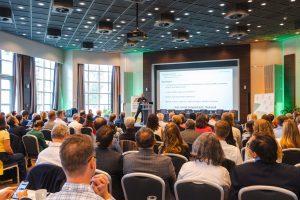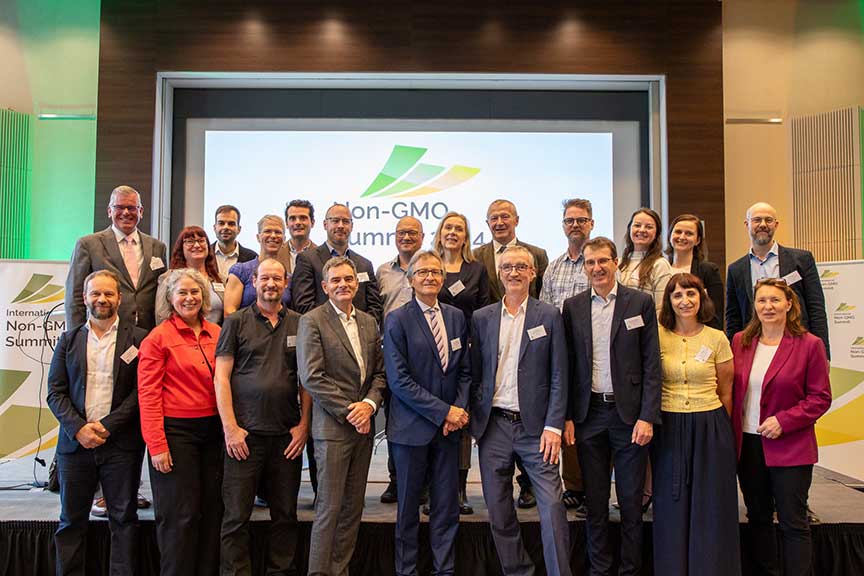International Non-GMO Summit brings together leaders of the non-GMO movement in EU and U.S.; unites against new GMO technologies
The international non-GMO industry continues to grow but faces threats from the possible deregulation of New Genomic Techniques (NGTs), such as gene editing. These were key takeaways of the International Non-GMO Summit held in Frankfurt, Germany in October.
More than 160 representatives from a thriving international non-GMO industry and leading European associations from 23 countries on four continents participated in the International Non-GMO Summit.
“Inspiring to be at a conference dedicated to non-GMO”
Representatives from the Non-GMO Project in the United States joined fellow members of the international non-GMO industry at the summit.
The summit offered a great opportunity to share information, said Hans Eisenbeis, director of mission and messaging at the Non-GMO Project.
“Europe is a big non-GMO market, and it was really interesting to meet with the European Non-GMO Industry Association (ENGA) and to share information, and we’re expecting to do that going forward,” he said.
Non-GMO Project representatives Erin Auld, in-house counsel, and Pauline Lauvin, director of quality and program integration, gave a presentation on the Non-GMO Project and its 17 years of non-GMO certification. Eisenbeis was on a panel discussion focusing on the diversity of non-GMO Markets.
“It was really inspiring to be at a conference dedicated 100% to protecting and promoting non-GMO and considering the non-GMO movement’s impact on food systems. To have non-GMO front and center for a conference was meaningful for us,” Eisenbeis said.
Heike Moldenhauer, secretary general of ENGA, said that summit attendees were interested to hear how the Non-GMO Project has succeeded in the U.S. where genetically modified crops dominate agriculture.
“We wanted the Non-GMO Project to tell our international audience the reasons why they started the project, how they implemented it and how they keep it running,” she said. “Their message: non-GMO is what many consumers want, it is feasible even in a difficult environment, and it is economically viable.”
“The non-GMO sector is here to stay!”
On behalf of the organizers, Alexander Hissting, Managing Director of VLOG (German Association Food without Genetic Engineering) said: “Non-GMO markets are economically very successful and are thriving with strong support from consumers. We are ready and willing to face current political and market challenges.” Hissting’s clear message: “The non-GMO sector is here to stay!”
For example in 2023, over three-quarters of the milk produced in Germany was non-GMO—72.1% was conventional milk and 4.5% was organic. That high percentage (average over 70%) of non-GMO milk has been consistent since 2020. In fact, non-GMO milk has represented over 50% of Germany’s total milk supply since 2018, growing steadily since then to its current high.
In the United States, the Non-GMO Project has verified more than 66,000 products representing more than $45 billion in annual sales, making it the fastest-growing label in the U.S. natural products industry and the most trusted non-GMO label among consumers.
“Our markets exist because many consumers in European countries and in North America do not want GMOs in their food. The task now is to find solutions to keep new GMOs out of our supply chains,” Moldenhauer said. “The summit highlighted ways to do this, such as developing new approaches for detection methods and adapting traceability systems.”

More than 160 representatives from 23 countries participated in the International Non-GMO Summit.
High-level political support, advocating freedom of choice
The possible deregulation of new GMOs, also called NGTs, by the EU Commission was the main topic of the summit. Representatives across the full non-GMO value chain are united in battling the current challenges posed by the planned deregulation. Summit participants gave a clear message for freedom of choice and transparency.
The current Hungarian Presidency of the Council of the European Union and the German Federal Ministry of Food and Agriculture (BMEL) want to work towards a compromise in the revision of the EU’s GMO legislation that ensures consistent labeling, coexistence, and traceability in dealing with new genetic engineering techniques.
German State Secretary Silvia Bender criticized the European Commission’s draft regulation on NGTs, doubting that it sufficiently considers the interests of consumers, farmers, and food processors: “The market for non-GMO products has been growing for years and we want to preserve this added value. To do this, we need functioning coexistence measures, from seeds to consumer. Our goal is to find a compromise for a socially acceptable way of dealing with the new genetic engineering methods, and we are working on that,” Bender explained.
Good availability of soy, rapeseed and corn—but even more potential
International experts in the field of raw material production and agricultural trade agreed that the most important regions for non-GMO commodities (especially soy, corn, and rapeseed) currently have good market coverage—in Latin America (especially Brazil) as well as in Europe (especially Ukraine). There are also sufficient growth opportunities to further increase the availability of non-GMO feed and thus keep pace with rising demand. The supply of non-GMO goods is secured for this year and the next, explained Bertalan Kruppa of Donau Soja, Maxime Montserrat of Bunge, and Daniele Marcomin of Italy-based Agribusiness di Covolato in their presentations on the current situation on the international markets.
Europe aims to source non-GMO feed to ensure meat, dairy, and egg products are non-GMO to meet consumer demand. Europe’s GMO labeling regulations have mostly kept foods containing GMO ingredients off retail shelves but products derived from animals fed GMO feed are not subject to the labeling rules.
As a result, eight EU countries—Austria, Germany, Hungary, France, Italy, Slovenia, Poland, and Czech Republic—and two non-EU countries—Switzerland and Bosnia/Herzegovina—have national non-GMO labeling laws. The laws allow food producers to label meat, dairy, and egg products as being produced using non-GMO feed.
Non-GMO Project and ENGA to collaborate
Moldenhauer concluded the summit with a clear call to the non-GMO industry “to keep calm and carry on.” Moldenhauer said there are hardly any new GMOs on the global markets—none in the EU, just a handful in countries where new GMOs have a non-regulated status. Therefore, markets will not be flooded with new GMOs in the coming years—as a glance at the companies’ development pipelines shows.
In addition, the development of audit strategies and research on detection methods for new GMOs and improvements in traceability are advancing. Moldenhauer is confident that significant progress will be reached to exclude new GMOs from non-GMO value chains.
After the summit the Non-GMO Project and the ENGA board met to discuss common topics such as certification standards and political developments the two groups must deal with on both sides of the Atlantic.
“We’re going to keep the conversation going with ENGA,” Eisenbeis said. “We have a lot of information to share with one another and strategy around educating the public and promoting non-GMO in the context of deregulation.”
“We agreed on a regular exchange to keep us updated,” Moldenhauer said.
The Non-GMO Project was also named as a supporting member of ENGA.
“This creates a real sense of commitment, and we are very proud to have our first non-European member!” Moldenhauer said.
The International Non-GMO Summit was organized by the leading EU non-GMO industry associations: VLOG, ARGE Gentechnik-frei (Austria’s non-GMO association), Donau Soja (an organization focusing on sustainable European non-GMO soy production), ProTerra Foundation (an organization promoting sustainability in the food and feed supply chain and segregated non-GMO materials), and ENGA.
Additional Source: European Non-GMO Industry Association





